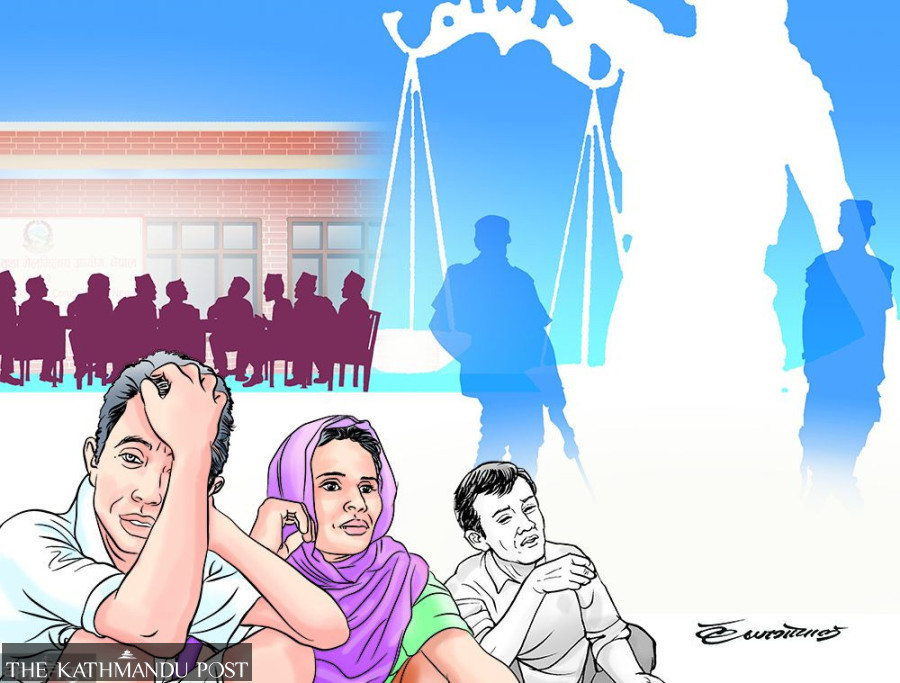National
Nepal delays reply to UN concerns over transitional justice
Four UN special rapporteurs had given Nepal 60 days, until February 15, but officials say they need more time.
Binod Ghimire
The Nepal government is delaying its response to the joint concerns of four United Nations special rapporteurs on adopting gender-sensitive policies in the transitional justice process.
On December 15, the special rapporteur of the Working Group on Enforced or Involuntary Disappearances, the special rapporteur on the Promotion of Truth, Justice, Reparation and Guarantees of Non-recurrence, the special rapporteur on Violence against Women and Girls, its Causes and Consequences, and the special rapporteur of the Working Group on Discrimination Against Women and Girls, had written to the government seeking clarification on its efforts to prevent gender discrimination in the transitional justice process.
They had given the government 60 days—until February 15—to respond to their concerns. However, five days after the end of the deadline, the government has yet to write back.
“We are still working on the response,” Rajendra Thapa, a joint-secretary at the Human Rights Division of the Prime Minister’s Office, told the Post. He reasoned that the government receives several such correspondences and takes time to respond.
The special rapporteurs wrote to the government based on the information that the Nepali authorities had failed to effectively search for the disappeared; undertake independent, impartial, thorough and effective investigations; and ensure integral reparations for the families.
The special rapporteurs have sought information on whether there are plans to introduce in the existing legal framework the possibility of obtaining and presenting a certificate of absence (due to enforced disappearance) instead of a death certificate to the victim’s family. A death certificate is currently needed for property transfer and other administrative tasks. They also asked about efforts being made to recognise relatives of disappeared persons as victims of enforced disappearances in their own right, in accordance with international law.
“Please indicate what measures have been adopted or are planned to include a gender perspective into the search of the disappeared persons, and in investigations of these cases. Additionally, please describe what measures are being taken to ensure the consideration of the gender dimension while designing rehabilitation, satisfaction and compensation policies,” read one of the concerns asking what was being done to include women victims and a gender-sensitive approach in the design, implementation and assessment of transitional justice legislation and policy.
In addition to seeking responses on several issues, they have stated that despite grave consequences of enforced disappearances for women, Nepali authorities have frequently overlooked serious issues of women victims and the specific difficulties they face. The UN rapporteurs also pointed out how the wives of the victims of enforced disappearances were facing problems in getting access to property and land ownership, as well as education.
If their concern is anything to go by, the definition of victims of the enforced disappearances is not in line with the Declaration for the Protection of All Persons from Enforced Disappearances of December 18, 1992, as well as the International Convention for the Protection of All Persons from Enforced Disappearances of December 23, 2010.
The notion of “victims of enforced disappearance” encompasses the disappeared person and any individual who has suffered harm as a direct result of an enforced disappearance. It includes the relatives, the rapporteurs argue.
As the Commission of Investigation on Enforced Disappeared Commission does not include relatives of forcibly disappeared among victims, the commission has received fewer complaints. “The statistics of the commission reportedly do not fully reflect the real magnitude of the problem and its wider ramifications in Nepali society,” they said.
The commission has received 2,558 complaints. Only 203 of them are from women.
The special rapporteurs have raised their concerns at a time when the Pushpa Kamal Dahal government and the ruling parties are preparing to endorse the bill to amend the Enforced Disappearances Enquiry, Truth and Reconciliation Commission Act. A section of the victims, too, is demanding immediate endorsement of the bill without much objection to the agreed provisions in the bill.
Submitting a memorandum to Prime Minister Dahal on Monday, they said the consultation by the government, coupled with the new provisions in the amendment bill establishing reparation as right, setting up separate investigation units within the Truth and Reconciliation Commission, and allowing a window to register new complaints, have raised their hope for justice.
They also have demanded setting up trustworthy commissions and developing reparation policies and funds in close coordination with all tiers of the government. The victims’ group claims that various interest groups are responsible for preventing the conclusion of the peace process in the name of consensus.
Nepal’s peace process has its own specialties. Therefore, it needs to be concluded through a homegrown modality, it said.
“We stand against delaying the amendments on any pretext,” Bhagiram Chaudhari, a former chair of the Conflict Victims Common Platform, told the Post. “We have urged the prime minister and the parties concerned to immediately endorse the bill.”
There are also other groups of conflict victims who want the peace process settled based on international standards.




 18.12°C Kathmandu
18.12°C Kathmandu














